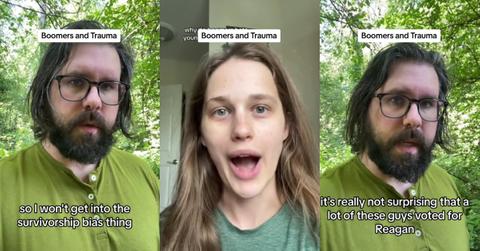“Trauma” TikToker Explains Boomer Attitudes Toward Younger Generations
"Jesus. This is insightful."
Published Dec. 4 2024, 9:44 a.m. ET

"Darn kids!" The phrase, often accompanied by a fist shaking at a cloud, has been part of the generational lexicon for as long as any of us can remember. It represents a social tension between youngsters and their elders, and it's not uncommon to see that this tension between boomers, millennials Gen Z, and Gen Alpha.
For some reason, though, Gen X always manages to get left out of this conversation. Today, Baby Boomers might scoff, "When I was your age, I worked all day and had a family” versus let’s say, smoking a vape and saying "no cap for real, for real" while having your masculinity called into question for enjoying an iced coffee.
This generational divide was dissected in a TikTok back-and-forth by Joseph Brassey (@josephabrassey) and TP (@TPBrulez801), who asked, "Why do boomers hate young people so much?" In his video, which has accrued 155,000 views on the application, Brassey offers a hot take as to why boomers are the way they are: trauma.
Boomers, he explained, were raised by the Greatest Generation — those who survived the Great Depression and World War II. Their parents, deeply scarred, saw the worst of what the world has to offer. This fostered an ideal of valuing individual strength and persistence.
Thus, the Greatest Generation passed on to them a hardcore belief in self-reliance and not allowing one's emotions to get in the way of accomplishing what's necessary to ensure your and your loved one's survival.
Brassey explained: "Basically, boomers were raised by a generation with massive trauma and no institutionalized support. Their parents prepared them for a world that could fall apart at any second — and then built a world that wouldn’t."

This upbringing, he argued, created boomers who believed that "postwar prosperity" was actually the fruit of their own self-reliance. As the boomers blossomed into adults, they began to view these values as universal truths, even when the circumstances around them changed.
Brassey ties this to Boomers’ support for Ronald Reagan, whose policies, many argue, ripped up social safety nets built by their parents' generation. Too busy and less universally uninformed about the ways of the world, many clung to a hard-lined philosophy that valued self-sufficiency.
For many who viewed Brassey’s video, his breakdown hit a nerve. One viewer remarked, "My grandmother literally only talked about the war and the Depression. Everything related back to those two topics."
Another called it “the best explanation I’ve seen.” While someone else said, “The level of accuracy in this is genuinely incredible.”

One may argue that Brassey's argument does have a few flaws due to the difficulty of quantifying emotional trauma. Furthermore, it could be argued that while trauma may have shaped the Greatest Generation in some ways, not all Boomers inherited these values or accepted them as incontrovertible facts of life. An entire generation's dynamics might not be so tidily summarized in a single TikTok take.
The perception of younger generations as lazy and entitled is nothing new. In a recent survey, 68 percent of boomers described younger people as less industrious than they were. However, data indicates that millennials and Gen Z are facing major economic hurdles — rising debt, stagnant wages, and an astronomical cost of living that worsened considerably since 2021.
It’s no wonder their world outlook differs so much from their parents and grandparents. A recent article titled, “The Younger Generation Isn’t Lazy; They’re Burned Out” encapsulates this perspective. The boomer rejoinder to this conundrum, however, would probably have been: “What is ‘burned out’? I couldn’t afford to be burned out."

It's difficult to imagine that there are going to be a lot of boomers, however, who have their viewpoints altered by a TikTok video. Ad Age writes that only 5 percent of boomers actually use the application on a daily basis.
So while Brassey seemed to stand up for some of the personality traits boomers have, they may have to hear this messaging from their grandkids.